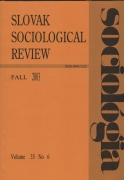Individual Farmers in Slovakia: Typology, Recruitment Patterns and Sources of Livelihood
Individual Farmers in Slovakia: Typology, Recruitment Patterns and Sources of Livelihood
Author(s): Gejza BlaasSubject(s): Social Sciences
Published by: Sociologický ústav - Slovenská akadémia vied
Keywords: Individual farmers; recruitment patterns; sources of livelihood; socio-economic pattern; farming; farmers in Slovakia;
Summary/Abstract: Individual Farmers in Slovakia: Typology, Recruitment Patterns and Sources of Livelihood. The paper is focussing on the analysis of some social features of individual farm holders and their households in Slovakia. During the years from the start of the transition process toward market economy a wide variety of farming types has emerged. Nevertheless, corporate farms, which are the successor ventures of former socialist co-operatives and state farms still dominate the current farming structure in terms of their share in the overall land use and output. Individual farms operate about 20 per cent of total farm land and represent a very diversified socio-economic pattern comprising fully commercial estate farming exploiting hired labour on one side, but also a large number of tiny self-subsistence part time farms on the other. As a result of this, the dual pattern of farm structure, which was typical for the earlier decades, has not changed too much. It is still characterising not only the overall structure, but also the segment of individual farms. As for the literature sources on social typology of stakeholders, the author is discussing earlier findings of Szelenyi, based on Hungarian empirical knowledge and the theory of rural enbourgeoisment. The most distinctive feature of farming types is the use of produce – marketing versus self-consumption. The former is typical for farmers-entrepreneurs and the later for non-registered farms, which are significantly smaller in size and serve predominantly subsistence needs of households. The author finds that there is a very close relation between the social background of these days’ individual farmers and the type of farming which they pursue. As survey data shows, among new farm holders there is a high share of persons with higher education and persons who hold higher positions in business, state administration and elsewhere, before starting their farm business. Neither experience in the farming sector nor special agricultural training has been crucial for the recruitment of new farmers. This applies especially for full-time commercial farmers. Farming households may as a rule, besides on income from farming, rely on other sources of additional or complementary income. As survey data show, these are mainly the work of spouses out of agriculture and the old age pension of the farm holder or his relatives. But farm holders themselves very often pursue a job other than farming, which is their principal or supplementary source of income. For only about one fifth of farmers is farming their single source of income. Sociológia 2003 Vol. 35 (No. 6: 557-578)
Journal: Sociológia - Slovak Sociological Review
- Issue Year: 2003
- Issue No: 6
- Page Range: 557-578
- Page Count: 22
- Language: English

